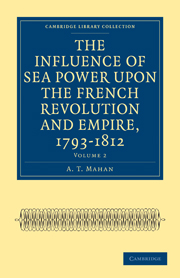Book contents
- Frontmatter
- Contents
- LIST OF ILLUSTRATIONS
- CHAPTER XII EVENTS ON THE CONTINENT, 1798-1800
- CHAPTER XIII EVENTS OF 1801
- CHAPTER XIV OUTLINE OF EVENTS FROM THE SIGNATURE OF THE PRELIMINARIES TO THE RUPTURE OF THE PEACE OF AMIENS
- CHAPTER XV THE TRAFALGAR CAMPAIGN TO THE SPANISH DECLARATION OF WAR. MAY, 1803—DECEMBER, 1804
- CHAPTER XVI THE TRAFALGAR CAMPAIGN—CONCLUDED. JANUARY — OCTOBER, 1805
- CHAPTER XVII THE WARFARE AGAINST COMMERCE DURING THE FRENCH REVOLUTION AND EMPIRE, TO THE BERLIN DECREE. 1793–1806
- CHAPTER XVIII THE WARFARE AGAINST COMMERCE, 1806–1812
- CHAPTER XIX SUMMARY. — THE FUNCTION OF SEA POWER AND THE POLICY OF GREAT BRITAIN IN THE REVOLUTIONARY AND NAPOLEONIC WARS
- INDEX
- Plate section
CHAPTER XIX - SUMMARY. — THE FUNCTION OF SEA POWER AND THE POLICY OF GREAT BRITAIN IN THE REVOLUTIONARY AND NAPOLEONIC WARS
Published online by Cambridge University Press: 05 August 2011
- Frontmatter
- Contents
- LIST OF ILLUSTRATIONS
- CHAPTER XII EVENTS ON THE CONTINENT, 1798-1800
- CHAPTER XIII EVENTS OF 1801
- CHAPTER XIV OUTLINE OF EVENTS FROM THE SIGNATURE OF THE PRELIMINARIES TO THE RUPTURE OF THE PEACE OF AMIENS
- CHAPTER XV THE TRAFALGAR CAMPAIGN TO THE SPANISH DECLARATION OF WAR. MAY, 1803—DECEMBER, 1804
- CHAPTER XVI THE TRAFALGAR CAMPAIGN—CONCLUDED. JANUARY — OCTOBER, 1805
- CHAPTER XVII THE WARFARE AGAINST COMMERCE DURING THE FRENCH REVOLUTION AND EMPIRE, TO THE BERLIN DECREE. 1793–1806
- CHAPTER XVIII THE WARFARE AGAINST COMMERCE, 1806–1812
- CHAPTER XIX SUMMARY. — THE FUNCTION OF SEA POWER AND THE POLICY OF GREAT BRITAIN IN THE REVOLUTIONARY AND NAPOLEONIC WARS
- INDEX
- Plate section
Summary
The outbreak of the French Revolutionary War found Great Britain unprepared. For nearly ten years her course had been directed by the second Pitt, who, though inheriting the lofty spirit and indomitable constancy of his father, yet loved peace rather than war, and sought the greatness and prosperity of his country through the development of her commerce and manufactures and the skilful management of her finances. He strove also consistently for the reduction of expenditure, including that for the military, and even for the naval establishment. As late as February 17, 1792, when the Revolution had already been nearly three years in progress and France was on the eve of declaring war against Prussia and Austria, he avowed his expectation of many years of peace for the British empire; and the estimates provided for only sixteen thousand seamen and marines. “Unquestionably,” said he, “there never was a time in the history of this country, when, from the situation of Europe, we might more reasonably expect fifteen years of peace than at the present moment.” When the war with Germany began, Great Britain proclaimed and steadily maintained an attitude of neutrality; and the Minister asserted over and over again, to France and to her enemies, the intention not to interfere with the internal affairs of that country. This purpose continued unshaken through the tremendous events of the succeeding summer and autumn; through the assaults on the Tuileries on June 20 and August 10, through the suspension of the king which immediately followed the latter date, through the revolting massacres of September, finally through the deposition of the King and the proclamation of the Republic.
- Type
- Chapter
- Information
- Publisher: Cambridge University PressPrint publication year: 2010First published in: 1893

